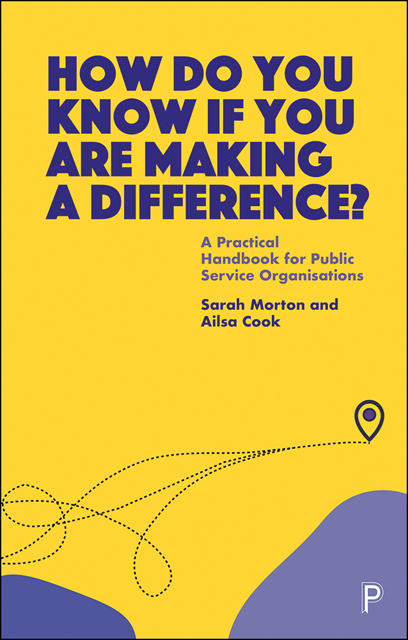 How Do You Know If You Are Making a Difference?
How Do You Know If You Are Making a Difference? Book contents
- Frontmatter
- Dedication
- Contents
- List of figures and tables
- Acknowledgements
- Preface
- 1 Why is it so hard to know if you are making a difference?
- 2 Why complexity thinking can help you understand public services
- 3 What data and evidence do you need to see what difference you are making?
- 4 Embrace the complex contex
- 5 Embrace the complex context
- 6 Clarify the change you want to see
- 7 Get going on your data, evidence and feedback improvement journey
- 8 Tracking progress towards outcomes and impacts
- 9 Telling the story of the difference your work makes
- 10 Using this approach in different contexts and sectors
- 11 Becoming an outcome- and impact-focused organisation
- References
- Index
3 - What data and evidence do you need to see what difference you are making?
Published online by Cambridge University Press: 20 June 2023
- Frontmatter
- Dedication
- Contents
- List of figures and tables
- Acknowledgements
- Preface
- 1 Why is it so hard to know if you are making a difference?
- 2 Why complexity thinking can help you understand public services
- 3 What data and evidence do you need to see what difference you are making?
- 4 Embrace the complex contex
- 5 Embrace the complex context
- 6 Clarify the change you want to see
- 7 Get going on your data, evidence and feedback improvement journey
- 8 Tracking progress towards outcomes and impacts
- 9 Telling the story of the difference your work makes
- 10 Using this approach in different contexts and sectors
- 11 Becoming an outcome- and impact-focused organisation
- References
- Index
Summary
In this chapter we are going to explore what data, evidence and feedback practices are helpful or unhelpful for knowing whether you are making a difference. Initially, we are going to dig into some of the cultures and practices that we know get in the way of having the feedback you need to understand change.
We will talk about the data and evidence that is best suited to understanding complex change. We will draw on our experience of working in different settings to explore data cultures that exist in all organisations. We will think about how these data cultures can help or hinder initiatives to do the right thing, and know they are doing the right thing. We will give some examples and highlight ways of applying this thinking to any specific work, especially making the case for using mixed data that includes qualitative data. We will then lay out what it means to go on a data improvement journey and offer some practical ways of thinking about the data and evidence needs in any specific setting.
In this chapter we set out:
• good data and evidence for complex change;
• data cultures and how they affect organisations and initiatives;
• making the case for qualitative data;
• getting started on a data improvement journey.
If data, evidence and feedback is something that excites and interests you (and it is definitely something that excites and interests us!), then you will enjoy reading the arguments and issues we take from this chapter forward into Chapter 7, where we look in more detail at practical ways to start on a data and evidence improvement journey. We hope that this chapter will arm you with the arguments you need to make the case for the approaches to data, evidence and feedback that can help you understand if you are making a difference.
What is included when we talk about data, evidence and feedback?
We talk in this chapter, and elsewhere in the book, about data, evidence and feedback. We want to encompass all the ways that any organisation uses information about what it does to understand what difference it makes.
- Type
- Chapter
- Information
- How Do You Know If You Are Making a Difference?A Practical Handbook for Public Service Organisations, pp. 30 - 42Publisher: Bristol University PressPrint publication year: 2022
